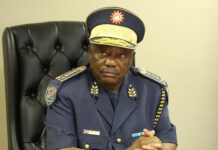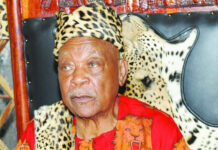By Sonja Smith | 6 August 2021
LAST year Aino Kalukambe from Okaku village in the Oshana region marked 30 years of service as a nurse and was looking forward to retirement and spending more time with her family in northern Namibia.
Kalukambe, who worked at Oshakati Intermediate Hospital, planned to renovate her family house and travel.
But everything ground to a halt in March 2020 as Covid-19 started trickling into Namibia.
She responded to a call from the government to assist at hospitals that were beginning to be overwhelmed by coronavirus patients.
Kalukambe was happy to go back to what she loved: helping people.
But her decision exposed her to the deadly virus.
She died in June this year after contracting Covid-19. A report from the Ministry of Health and Social Services and the World Health Organisation dated 2 August states that 13 healthcare workers have died of Covid-19 in Namibia so far.
It also reported that 4 400 were infected with the virus.
These figures have yet to be updated.
The Namibian traced the names of 23 health officials who have died. Sources estimate this figure to be much higher.
DREAMS CUT SHORT
To understand the sacrifices healthcare workers have made, The Namibian spoke to the family and friends of some who have succumbed to Covid-19.
Kalukambe’s husband, Rehabeam, says after retiring she didn’t even get the chance to spend time at home and rest.
“She was among those called back due to their experience,” he says.
Nonetheless, she had no problem going back to work.
“She was happy. It’s a job she has been doing for years,” he says.
But one Friday afternoon in June, his wife came home complaining of not feeling well.
“She was a strong woman. She said she was not feeling well, but kept the strength up that day,” Rehabeam says.
A day later Kalukambe started deteriorating.
“On the Saturday she was in bed feeling weak. At midnight, we had to rush her to the Medipark Clinic at Ongwediva. She never came home again.”
Kalukambe’s daughter Katri says her mother never missed work.
“She was a dedicated theatre nurse who loved her job. You would not hear her complain,” she says.
Katri says her mother’s colleagues loved her.
Kalukambe planned a trip at the end of September to a place she had always dreamed of: Swakopmund.
“I was planning on taking her,” Katri says.
Justina Shindombe has known Kalukambe since they were 12 years old. The two attended the same primary and high schools.
In the early 80s, they met up again as nursing students at the Oshakati Nursing Training College and worked together until Kalukambe retired in 2019.
“In September 2020, we got the chance to work as nurses under the Covid-19 programme,” Shindombe says.
“She was a dear friend, kind-hearted, and a beautiful soul.”
Engelebertha Ekandjo’s story is similar.
With just a month to go until she turned 61, she too was looking forward to retirement.
She died from the coronavirus on 3 July this year, after practising nursing for 24 years.
Her sister Teresia says Ekandjo never said no to patients.
“She was peaceful and a hard worker,” she says.
LIFE CUT SHORT
After six years of studying medicine in Ukraine, Twamona Kavezembi-Simataa returned to Namibia in November 2016 with the world at her feet.
She had met the man of her dreams and they got married in March last year.
Known as TK, Kavezembi-Simataa continued working at the Black Chain Clinic in Windhoek as a medical doctor while pregnant with her second child.
She contracted Covid-19 and died on 3 July – two days after giving birth.
Two weeks earlier she had celebrated her 31st birthday.
Kavezembi-Simataa was one of the first doctors to be assigned to Covid-19 healthcare facilities by the health ministry.
Her aunt Sara Elago says she was a dedicated doctor who loved her family.
“She was fearless. Even during the pandemic she did not have complaints about going to work. She was a very kind person who loved helping people – especially her patients,” she says.
Elago says the family has taken some comfort in the fact that she died on the front line.
FOUGHT TO THE END
Peter Angala (62), a former Oshikoto regional health director, died at Otjiwarongo Mediclinic on 14 June this year.
He left behind a wife, seven children and seven grandchildren.
Peter’s son, Angala, says his father fought until the end.
The two spoke on 8 June.
“He did not sound like himself. He was breathing as if he was running. I asked what the problem was, he said he was cold,” Angala says.
He says his father contacted a family doctor to be tested for Covid-19, and was advised to self-medicate while waiting for his result.
“The result came back positive two days later. He notified my mother, who prepared for his isolation at home,” Angala says.
“It was on a Sunday morning when he got seriously ill and so weak that he could not even stand up. My mom rushed him to the hospital,” he says.
Angala says his father’s condition continued to deteriorate and the doctors said they needed to admit him to an intensive care unit (ICU).
They finally found space in an ICU at Ondangwa.
“I then secured an aircraft and a pilot to fly him from Otjiwarongo to Ondangwa,” Angala says.
“I called my mom and I could hear he was gasping for air. It was not a nice thing to hear, but he fought till the end,” Angala says.
A nurse by profession, Peter also worked as regional health director in the Omaheke and Otjozondjupa regions.
His wife of 35 years, Suoma, describes him as a unifier and an optimist.
“A family man, always full of jokes, highly optimistic, solution driven, a unifier and always in management mode,” she says.
Suoma says Peter was the kind of listener “who won’t have a solution for a problem today, but always kept the problem in his mind until he found a solution”.
WARRIORS
Fresh from Windhoek’s National Health Training Centre, Shirlene ‘Lienkie’ Bock (31) started working at Walvis Bay State Hospital in January this year, but never got a chance to enjoy the fruits of her hard work.
Bock died on 14 June, seemingly after contracting the novel coronavirus, colleagues said.
Others who succumbed to the virus include Rosa Nikanor, who died on 25 June at Onandjokwe District Hospital.
Medical superintendent Dr Akutu Munyika says Nikanor worked as a nurse at Tsumeb State Hospital.
Windhoek private doctor Dr Masoud Nasser died on 9 June at Windhoek Central Hospital, a colleague said.
Keetmanshoop District Hospital lost Elsie Kisting on 27 June. Kisting (60) worked as a nurse.
The hospital, like many other state-run facilities, struggled to accommodate patients.
On 5 July Windhoek doctor Johannes van Zyl, who ran a private practice in the capital, died of Covid-19.
He was 63.
His best friend of more than 15 years, Dr Gennadiy Voronkov, said Van Zyl was intelligent and had a good sense of humour.
“I joined his practice more than 14 years ago. Our common field of interest in medicine was anaesthesia,” Voronkov says.
According to Voronkov, Van Zyl would help patients “any time” and “all the time”.
“He was a great person: kind, honest, friendly and intelligent. He had a fine sense of humour, and was always willing to help,” he says.
The Nau-Aib clinic at Okahandja recorded the death of Georgina Kachibonwa on 6 July.
Kachibonwa worked as a nurse at the facility, Okahandja District Hospital’s senior medical officer, Dr Mohan Kumar, confirmed.
Albertina Amakali, who worked at Onandjokwe District Hospital, died on 27 July.
She is reported to have died on the way from Onandjokwe to Medipark Private Hospital.
Lady Pohamba Private Hospital in Windhoek lost the 54-year-old Asteria Nanyeni on 31 July, after she contracted the virus at work.
Her sister, Juliana Haimbodi, confirmed her death to The Namibian.
Two nurses, Rachel Uupindi and Paulina Shilomboleni, who worked at Oshakati State Hospital, died last month.
Last year, Swakopmund State Hospital lost 59-year-old nurse Petrina Kulatau.
Cecilia Nepolo, a nurse at the Roman Catholic Hospital at Oshikuku in the Omusati region, died on 15 July, the hospital’s matron, Christine Mayungo, said.
Sources say at least two healthcare workers of Windhoek Central Hospital have died.
THE STORM IS UPON US
At the height of the pandemic, doctors and nurses braved working at healthcare centres that lacked basic equipment.
Some had to let their patients die because they ran out of oxygen.
Ministry of Health and Social Services executive director Ben Nangombe says strategies have been put in place to help keep front-line workers safe.
“It’s not just a matter of procuring and making personal protective equipment available. It’s also about ensuring that front-line health workers are empowered with relevant skills on their usage,” Nangombe says.
He says the ministry is also trying to ensure that front-line workers look out for each other.
“We encourage them to be there for each other when they are on and off, so that the chances of infection are eliminated,” Nangombe says.






